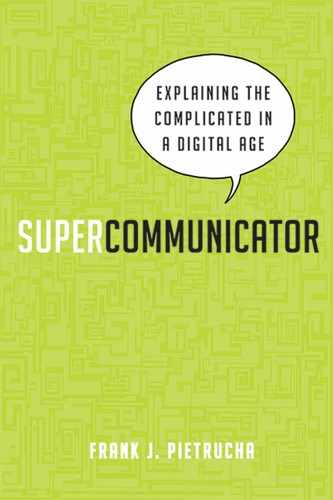Advice for Content Experts
This chapter speaks to engineers, scientists, and other smart folks who may be brilliant at what they do but are challenged in getting nonspecialists informed, let alone excited, about a technical subject. Bad writing or ineffective speaking can kill your project before it gets off the launch pad. If you can't articulate your message in a way that your audience can comprehend, you can't expect them to share your enthusiasm—let alone write a check. Too many technically minded folks don't get it that their brilliance can be overlooked if it's not understood.
If this describes you—please take action before an important opportunity slips away. Improving your writing skills is a noble pursuit if you're not especially adept in this area, but keep in mind that effective writing isn't something you're likely to learn overnight. It takes years of education, followed by even more years of practice. And remember also that some people are just naturally inclined to be good writers but might not have your technical skills. Public speaking can be improved with good direction, but you still have to know how to package your information in a way that's meaningful for your audience.
This book will help you cross certain hurdles. But if you're truly struggling in your efforts to decomplicate content, you may need professional help. Working with a professional communicator can help you reach new heights faster than anticipated. If you work for a large institution there may be preapproved assistance available. Look into these valuable options. If you're with a smaller organization or work independently, there are many qualified writer/editors looking for pick-up assignments. You'll still need your copy of Supercommunicators, however, because as the content expert you need to provide your communicator with direction. The greater awareness you have of the communication process and the more involved you are, the better the end product will be.
Guidelines for Working with Writers
Working with a communicator isn't always easy for subject experts. Here are a few tips if you are new to this idea:
- Make sure your writer is qualified. Writers should have experience working on the kind of document or product with which you need help. They don't need to be a subject expert if your assignment is to communicate to nonspecialists. Technical writers (writers with technical background) are preferred when you need to explain a highly technical subject to other specialists.
- Give writers a chance—cooperate with them. View them as an ally who can help make your vision a reality…not an obstruction keeping you from the lab, the office, or a meeting.
- Offer writers background information so they can educate themselves on information relevant to your subject. If you're too busy, refer them to other colleagues who can fill them in as needed.
- Make time for them. If the project is important, you will find time in your schedule to meet with your writer in person, by phone, or by Skype.
- Give regular, constructive feedback. Be patient. Tell a writer to do it over if it's not acceptable.
You may be able to find someone affiliated with a local university or an individual who is employed full-time but in search of extra income to help alleviate your editorial woes. You can also find countless writers/editors willing to help you for a small fee from any number of online bulletin boards. Top-of-the-line professional writers can charge over $100 an hour for their time, but there are many competent guns for hire for under $50 an hour—often cheaper if outsourced online. On some websites you can have writers bid to do work for you based on a description you provide. Just make sure your hired hand has sufficient experience and good credentials.

